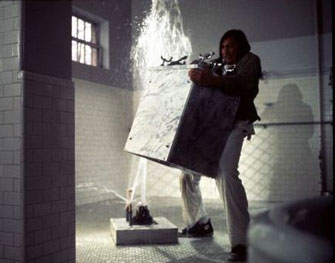In the Old Testament, Shepherds are used to represent leaders of God’s people (see Isaiah 63:11; Jeremiah 23:2). Shepherds watch for enemies who might attack the sheep, and they defend them when necessary. They tend to sick or wounded sheep and search for and rescue lost or trapped ones.
In Christ’s teachings, shepherds love their sheep and try to earn their trust. The sheep know, love, and trust the shepherd above all others. A good shepherd will even die for his sheep. Christ contrasts the shepherd with the hireling, who deserts the sheep in times of danger because he does not love them.
There are movies where the main character exhibit this behavior.
One of Jack Nicholson’s early films was “One Flew over the Cukoo Nest” (1975). Randall McMurphy (Jack Nicholson) is sent from the state penitentiary to a mental hospital in order to be evaluated. McMurphy is promptly situated as the deviant who will challenge the establishment, embodied principally by the villainous Nurse Ratched. Randall demands to know what medication is being administered to him, attempts to teach fellow patients basketball and black jack, and instigates a futile campaign to have the schedule altered so that everyone may watch the World Series. His threat to the stability of the institution is finally acknowledged by the Board after he commandeers the hospital bus in order to take his disciples on a fishing expedition. The group gradually questions the hospital’s procedures. A violent uproar ensues, causing Randall’s beloved disciple “Chief” (Will Samson) to physically assault a ward who attempts to subdue McMurphy.
After the administration of corrective shock treatment to the dissenters, McMurphy begins to persuade the others to leave the institution, a premise they resist due to a lack of faith in their own capabilities to function on the outside.

In the concluding sequence, it is obvious that McMurphy has empowered at least one of his disciples to do what was once unthinkable. “Chief” hurls a limestone bathroom fixture through the window and escapes the hospital. The rush of water at the beginning of the scene can be linked to baptism.
